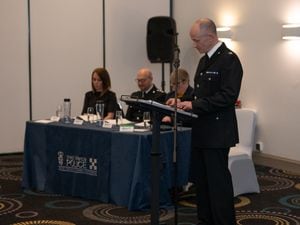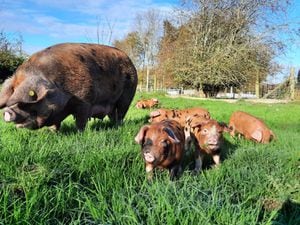Nigel Hastilow: Lady is for turning with calculated general election call
Theresa May has always been a methodical and careful politician, not given to rash decisions or sticking her neck out.
We saw that in the way she positioned herself to be the last one standing in the Tory leadership contest after the EU referendum.
She is a shrewd political operator whose luke-warm 'submarine' support for remaining in the EU under David Cameron allowed her to change into the Brexiteer-in-chief once safely ensconced in Downing Street.
So her decision to call a General Election for June 8 is based on clear political calculation and all the spiel she gave us about being reluctantly forced into it by the manoeuvrings of her opponents in Westminster is nothing more than fairly flimsy camouflage.
There is only one reason why she's called the election and it's a simple but perfectly respectable one – she thinks the Conservatives will do particularly well and increase her working majority of 17.
That's certainly what the opinion polls have been saying for the past few weeks and if Mrs May sustains her lead at about 20 per cent in the polls, she can look forward to a majority of more than 100.
That must be the real calculation behind her decision to call a snap election despite all her previous protestations that she would carry on for a full five-year term.
Today Parliament has no real choice but to support her plan for an election even though Labour MPs can be almost certain that, under Jeremy Corbyn's leadership, a Tory landslide looks pretty certain.
Mrs May has thrown down the gauntlet to her opponents and given them the chance they all say they want to fight for their views in the arena where it matters most – at a General Election.
They have no option but to accept the challenge and, of course, those Labour MPs who survive what looks likely to be a bloodbath on June 8 will at least have all the evidence they need to get rid of Mr Corbyn and have five years to rebuild the party.
MPs like Rob Marris in Wolverhampton South West and David Winnick in Walsall North will be eying their majorities nervously. Mr Marris only won by 801 votes; Mr Winnick by 1,937.
Any swing to the Conservatives and they will both be history. Indeed, if today's polls were correct, Labour could expect to lose 50 seats.
And most Labour MPs know there is no point running campaigns which focus on their party leader. Jeremy Corbyn is Theresa May's greatest electoral asset. Labour MPs will be running local campaigns based on the work they do in their constituencies and for their constituents. They haven't got much alternative.
In Telford though the Labour Party will undoubtedly target Conservative Lucy Allan, whose majority of 730 secured one of the last election's most narrow victories.
The Prime Minister went to great lengths to position this as the Brexit election. Though we have voted to leave the EU, she says, the process needs unity and leadership at Westminster. There is some truth in this but unity at Westminster can never be achieved because Parliament represents more or less all the different views and opinions of the voters.
What Mrs May means is she wants a majority that's big enough for her to ignore the opposition parties' moans, the gripes of a few pro-EU Tories and a mandate which puts her unelected critics in the Lords back in their box.
There is a danger in making this a Brexit election because only 52 per cent of the voters actually chose to leave the EU. Many of the 48 per cent who wanted to remain will not have changed their minds while some of those who voted to leave may have changed theirs.
Labour has been conflicted over Brexit since the beginning. Jeremy Corbyn's views were ambivalent, to say the least. It is still hard to tell what the party's views on Brexit actually are, especially as many Labour constituencies voted to leave the EU.
There is greater clarity among the Liberal Democrats and leader Tim Farron has made it clear his party is in favour of a second referendum. Remainers therefore have one party offering a clear alternative to the Conservatives outside Scotland.
Nick Clegg's Lib-Dems devastatingly lost 49 of their 57 seats at the 2015 election because they had spent the previous five years propping up David Cameron's Conservatives and reneging on their promise about tuition fees for students.
This time round they are the only party apart from the Scottish Nationalists clearly interested in staying in the EU. This could disrupt Mrs May's calculations if enough Remainers decide fighting Brexit is the overriding consideration in casting their vote.
Even so, many vulnerable Tory MPs who ousted Lib Dems just a couple of years ago are in the West Country where support for Brexit was strong. London and the South East will be a happier hunting ground for Mr Farron.
The Remainers of the posh suburb of Richmond recently handed the Lib Dems a by-election victory which should have been about the expansion of Heathrow Airport but ended being their verdict on Brexit.
Gordon Brown, another Prime Minister who got the job without a General Election, had a chance to go to the country a few months into his premiership, bottled it and never had such a good opportunity again.
In the view of many Conservatives, there will never be such a favourable moment as there is today to secure a big majority so it's understandable the lady is for turning.
It's an opportunistic and entirely political calculation. But Mrs May is not one to take risks. In her view, though the Tory lead will almost certainly diminish in the coming weeks, she doesn't see calling an early election as much of a gamble. And even in these politically-volatile days, thanks to Jeremy Corbyn, she's probably right.





